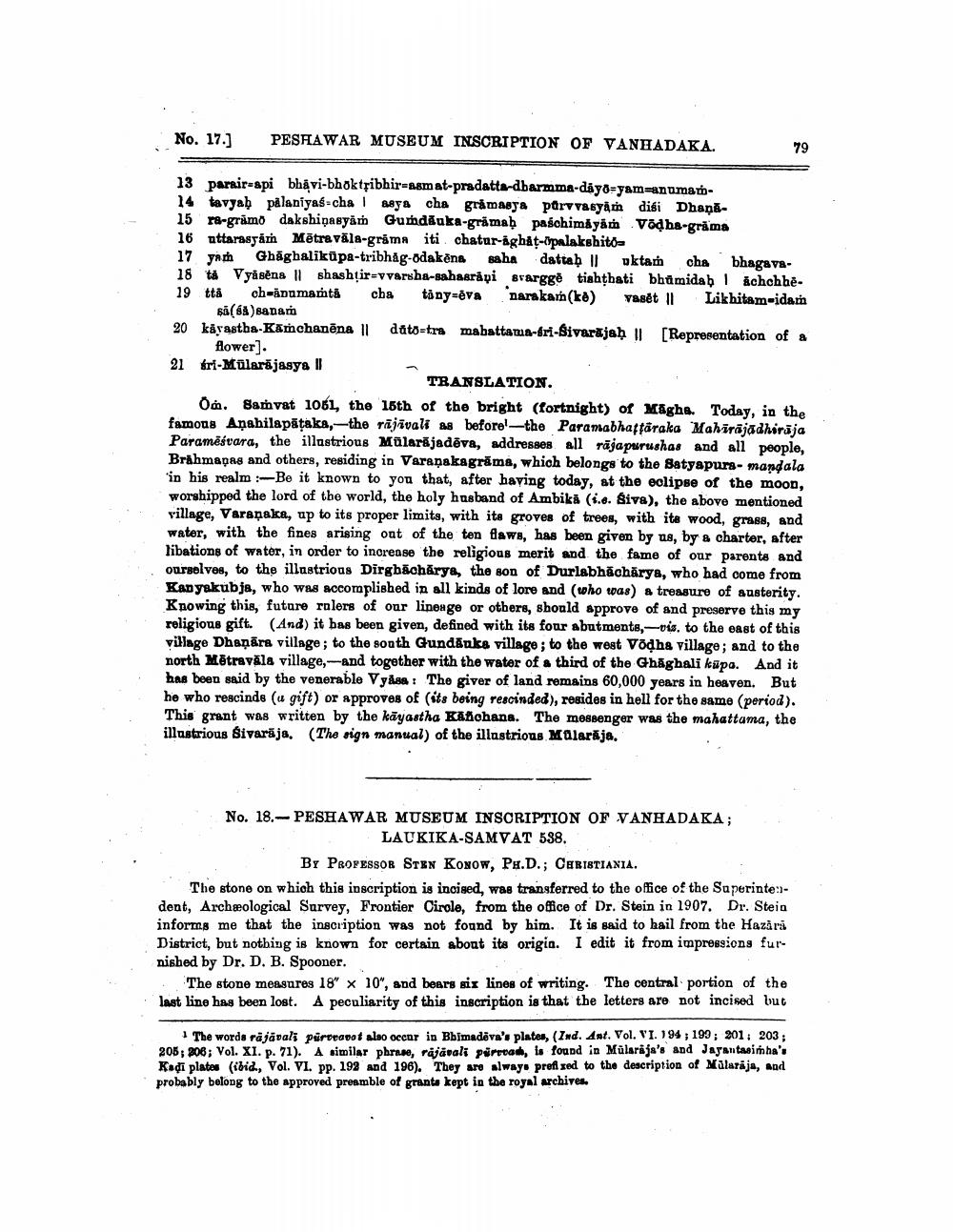________________
No. 17.]
PESHAWAR MUSEUM INSCRIPTION OF VANHADAKA.
13 parsir-api bh&vi-bhoktsibhir-asmat-pradatta-dbarmma-dayð=yam animar14 tavyab pålaniyas-chal ways cha gråmasya porv vasyam difi Dhaņā15 ra-gråmo dakshiņasyam GundĀuka-gråmaḥ paschimåyår Vödha-grama 16 attarasyå Mētravāla-grama iti chatur-aghat-ipalakshita 17 yath Ghāghalikupa-tribhåg-odakēna saha dattab l uktar cha bhagava18 to Vyåsens || shashțir-vvarsha-sahaarapi svarggě tishthati bhumidab ichchhe. 19 ttä сh-apamamta cha tany=ēva Darakan(ke) yaset || Likhitam-idam
sā(sa) sanam 20 kärastha-Kamchanēna 11 dato=tra mabattama-fri-Sivarajah | [Representation of a
flower]. 21 tri-Mülarājasya II
TRANSLATION. Om. Samvat 1061, the 15th of the bright (fortnight) of Maghe. Today, in the famous Anahilapitaka,-the rājāvali as beforel-the Paramabhaffäraka Maharajadhiraja Paramēšvara, the illustrious Mülarājadēva, addresses all rajapurushas and all people, Brahmaņas and others, residing in Varanakagrāms, which belongs to the Satyapura- mandala in his realm :-Be it known to you that, after having today, at the eclipse of the moon, worshipped the lord of the world, the holy husband of Ambika (1.6. Siva), the above mentioned village, Varanaka, up to its proper limits, with its groves of trees, with its wood, grass, and water, with the fines arising out of the ten flaws, has been given by us, by & charter, after libations of water, in order to increase the religious merit and the fame of our parents and ourselves, to the illustrious Dirgbáchārye, the son of Durlabhācharya, who had come from Kanyakubja, who was accomplished in all kinds of lore and (who was) a treasure of austerity. Knowing this, future rulers of our lineage or others, should approve of and preserve this my religious gift. (And) it has been given, defined with its four abutments,-vis, to the east of this village Dhaņāra village; to the south Gundānks village; to the west Vodha village, and to the north Mētravāla village,-and together with the water of a third of the Ghāghali kūpe. And it has been said by the venerable Vyas : The giver of land remains 60,000 years in heaven. But he who rescinde (a gift) or approves of (its being rescinded), resides in hell for the same period). This grant was written by the kāyastha Kafchans. The messenger was the mahattama, the illustrious Sivaraja, (The sign manual) of the illustrious Malaraja.
No. 18.-PESHAWAR MUSEUM INSCRIPTION OF VANHADAKA;
LAUKIKA-SAMVAT 538.
BY PROFESSOR STEN Konow, PH.D.; CHRISTIANIA. The stone on which this inscription is incised, was transferred to the office of the Superinte:dent, Archeological Survey, Frontier Cirole, from the office of Dr. Stein in 1907. Dr. Stein informs me that the inscription was not found by him. It is said to hail from the Hazira District, but nothing is known for certain about its origia. I edit it from impressions furnished by Dr. D. B. Spooner.
The stone measures 18" x 10", and bears sis lines of writing. The central portion of the last line has been lost. A peculiarity of this inscription is that the letters are not incised but
The words räjävalt pürorapot slao occur in Bbimadova'plates, (Ind. Ant. Vol. VI. 194, 199; 301: 203 ; 205, 206; Vol. XI. p. 71). A similar phrase, räjävali pürrtad, is found in Mülarija's and Japantainha's Kadi plates (ibid, Vol. VI. pp. 192 and 196). They are alway• prefixed to the description of Malaraja, and probably belong to the approved preamble of granta kept in the royal archives.




